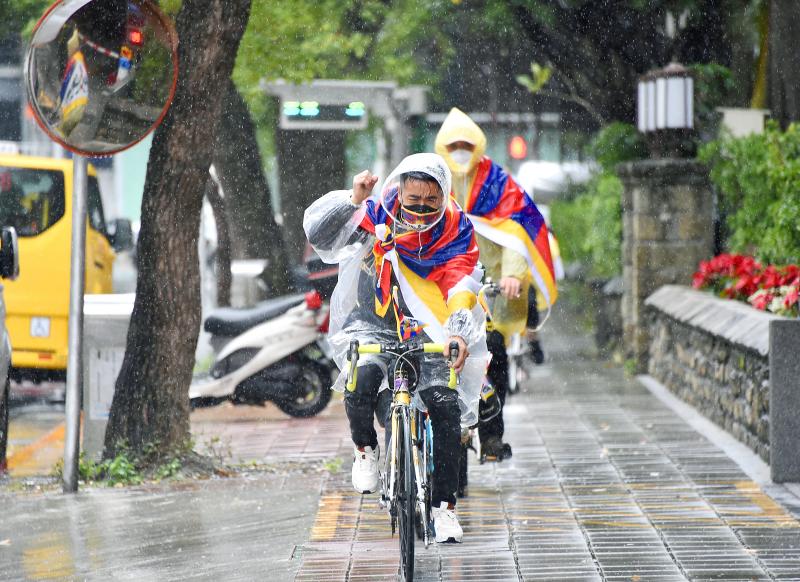Tibetan groups and rights advocates were yesterday joined by independent Legislator Freddy Lim (林昶佐) and New Power Party Legislator Chiu Hsien-chih (邱顯智) in launching this year’s “Cycling for a Free Tibet” campaign ahead of next month’s main event.
This year’s event is to mark the 63rd anniversary of “Tibetan Uprising Day,” when Tibetans on March 10, 1959, joined in mass protests in a failed rebellion against nine years of Chinese military rule, Human Rights Network for Tibet and Taiwan director Tashi Tsering said.
“It has been more than 70 years since a Chinese military invasion took control of Tibet. They have placed heavy restrictions on Tibetans, to brainwash them, but Tibetans have never given up hope,” Tashi said.

Photo: Tu Chien-jung, Taipei Times
The “Cycling for a Free Tibet” campaign began in 2011 to raise public awareness of the pain and suffering of Tibetans’ plight, he said.
The annual campaign aims to “give a voice to those who are victims of Chinese state brutality and persecution,” Tashi said, as he joined other human rights advocates draped in the Tibetan “snow lion” flag on a cycling tour that finished at the Bank of China branch in Taipei’s Xinyi District (信義).
“The Beijing regime has carried out oppression and human rights abuse against Tibetans, Uighurs and Hong Kongers. It is Taiwanese who raised their voices to condemn China, as we have always had to stand up to support victims of subjugation,” Chiu said.
“Taiwanese have also protested numerous times against the incursion of Chinese warplanes more than 900 times into our air defense identification zone,” Chiu said, urging all political parties in the Legislative Yuan to work together on bills to assist political refugees.
Under a proposed refugees act, Taiwan would consider granting residency in suitable cases, such as the nation has done in the past for exiled Tibetans and those who have lost their homelands, he added.
It is the right principle for a free and democratic country with respect for human rights to follow, Chiu said.
In an address to the participants, Lim said: “Taiwanese have felt China’s aggression and its violation of Taiwan in many sectors. We have spoken out against Beijing’s abuse and atrocities in Tibetan, Hong Kong and other places.”
“We are on the front line against China, and we have the courage to stand up and fight,” Lim said. “We are visible on the international stage. By doing so, more people in other countries are willing to protest against China.”
Yesterday was selected as the start of this year’s campaign because the day is known as Lhakar (“White Wednesday”), a day on which Tibetans traditionally express spiritual devotion and pray for a long life.
The day has also become associated with the Tibetan protest movement.
In Taipei, people can join cycling events along planned routes to commemorate “Tibetan Uprising Day” on Wednesday next week, Feb. 23, and March 2 and 9.
A cycling event is also to take place on March 6 in Kaohsiung and on March 12 in Taichung, released information said.

Nipah virus infection is to be officially listed as a category 5 notifiable infectious disease in Taiwan in March, while clinical treatment guidelines are being formulated, the Centers for Disease Control (CDC) said yesterday. With Nipah infections being reported in other countries and considering its relatively high fatality rate, the centers on Jan. 16 announced that it would be listed as a notifiable infectious disease to bolster the nation’s systematic early warning system and increase public awareness, the CDC said. Bangladesh reported four fatal cases last year in separate districts, with three linked to raw date palm sap consumption, CDC Epidemic Intelligence

The manufacture of the remaining 28 M1A2T Abrams tanks Taiwan purchased from the US has recently been completed, and they are expected to be delivered within the next one to two months, a source said yesterday. The Ministry of National Defense is arranging cargo ships to transport the tanks to Taiwan as soon as possible, said the source, who is familiar with the matter. The estimated arrival time ranges from late this month to early next month, the source said. The 28 Abrams tanks make up the third and final batch of a total of 108 tanks, valued at about NT$40.5 billion

Two Taiwanese prosecutors were questioned by Chinese security personnel at their hotel during a trip to China’s Henan Province this month, the Mainland Affairs Council (MAC) said yesterday. The officers had personal information on the prosecutors, including “when they were assigned to their posts, their work locations and job titles,” MAC Deputy Minister and spokesman Liang Wen-chieh (梁文傑) said. On top of asking about their agencies and positions, the officers also questioned the prosecutors about the Cross-Strait Joint Crime-Fighting and Judicial Mutual Assistance Agreement, a pact that serves as the framework for Taiwan-China cooperation on combating crime and providing judicial assistance, Liang

A group from the Taiwanese Designers in Australia association yesterday represented Taiwan at the Midsumma Pride March in Melbourne. The march, held in the St. Kilda suburb, is the city’s largest LGBTQIA+ parade and the flagship event of the annual Midsumma Festival. It attracted more than 45,000 spectators who supported the 400 groups and 10,000 marchers that participated this year, the association said. Taiwanese Designers said they organized a team to march for Taiwan this year, joining politicians, government agencies, professionals and community organizations in showing support for LGBTQIA+ people and diverse communities. As the first country in Asia to legalize same-sex